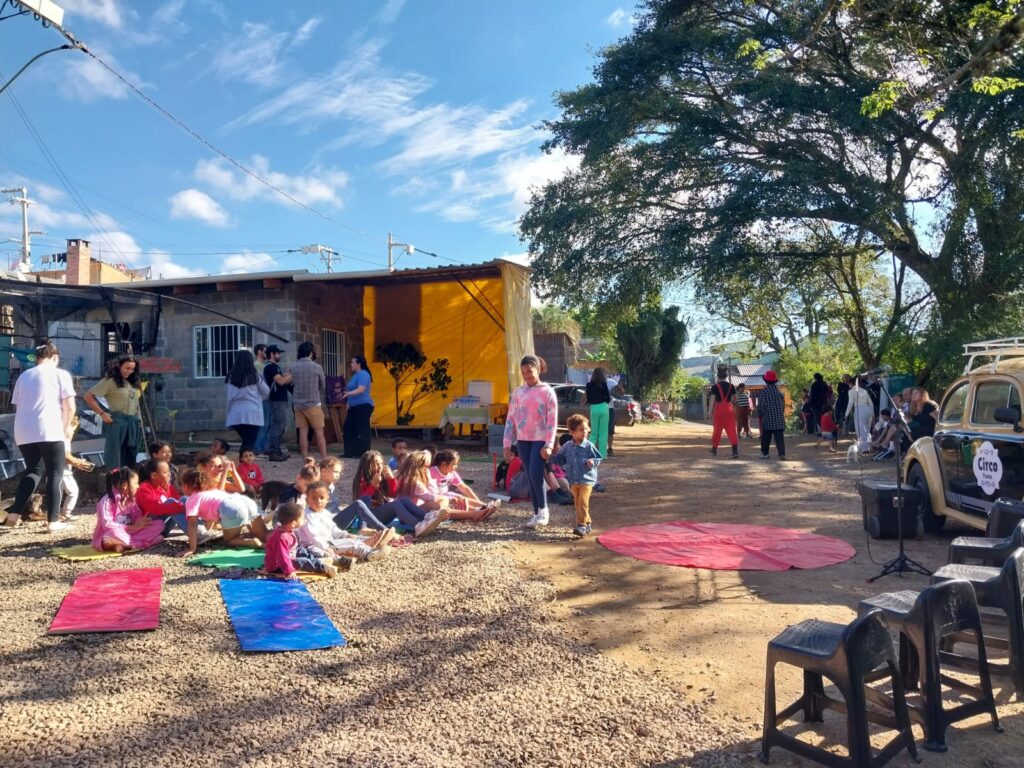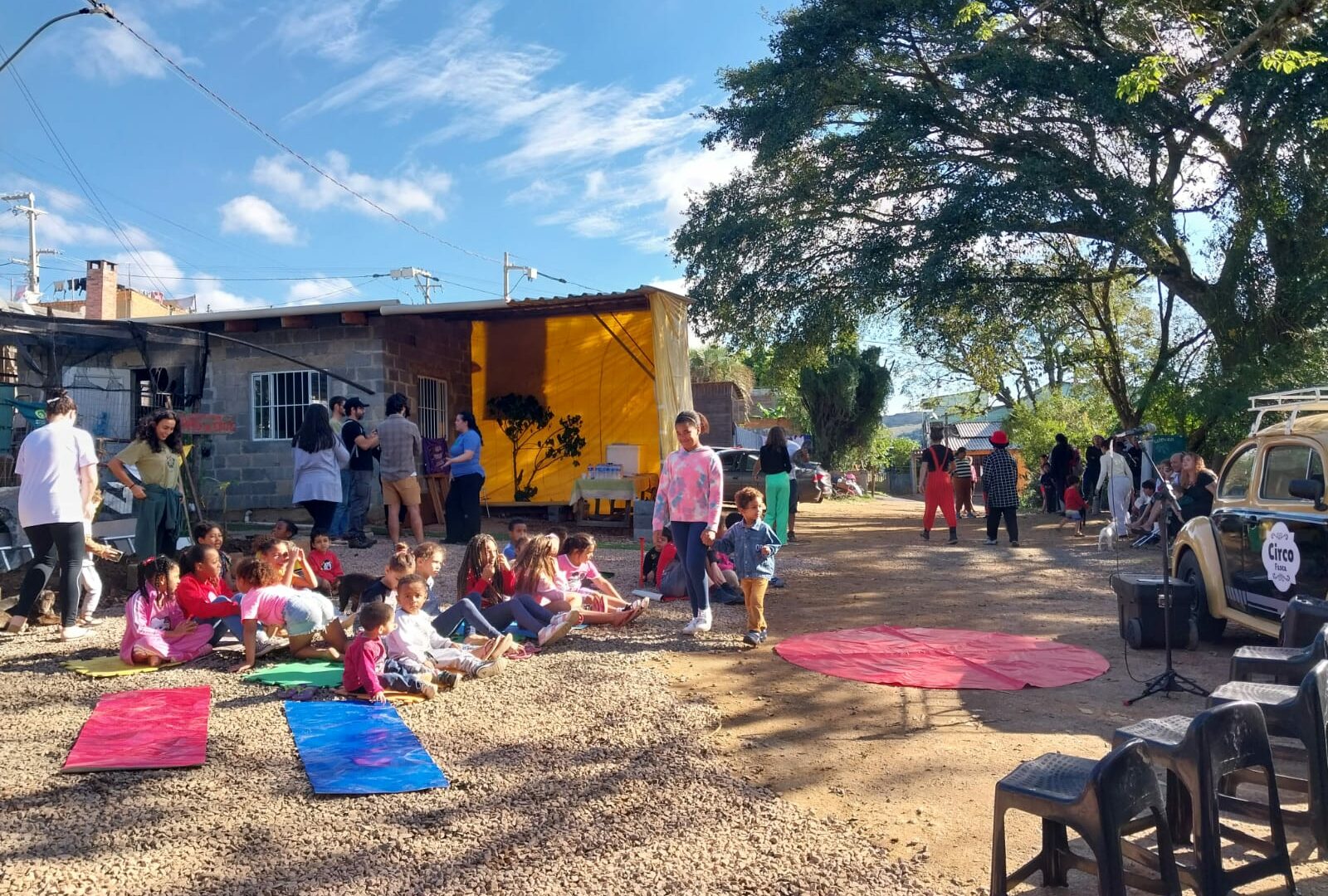The space where the Periferia Feminista group operates, in Morro da Cruz, in Porto Alegre (Rio Grande do Sul); movement, which maintains a community garden on site, has distributed around 900 lunch boxes per day to those affected by the floods in RS – Alice Balestro Floriano
By Alessandra Ceregatti,
Cintia Barenho,
Claudia Prates,
Maria do Carmo Bittencourt,
Natália Blanco and
Thayane Cazallas do Nascimento*
The original article was published on May 16th, so some numbers may have changed.
“It is urgent to think about socio-environmental justice as a central axis in the reconstruction of the state”
In face with the state of public calamity experienced in Rio Grande do Sul, it is urgent to think about socio-environmental justice as a central axis in the reconstruction of the state, in harmony with nature, as opposed to the false “solutions” presented by the corporate power. This is the biggest environmental catastrophe in the state’s history: more than 2 million people were directly affected by flooding or landslides. As of May 15, more than 76,000 are in shelters located throughout the state. There are 148 people dead, 125 people missing and another 806 are injured.
When we mention ‘state’ in this text, it refers to Rio Grande do Sul, the region affected by the floodings located at the south of Brazil, bordering Uruguay and Argentina.
The sustainability of life is deeply threatened in the state, with thousands of people without access to water, electricity, transportation, and communication. Around 40% of the state´s public education network was affected. Schools are being used as shelters, classes are suspended, health units and other social assistance equipment and public offices are underwater. Animal farms and rural and urban farms were completely destroyed, and the biodiversity was devastated in many regions.
In the midst of this desolate scenario, social movements and popular organizations once again take the lead in confronting hunger, guaranteeing food sovereignty for thousands of people who face vulnerability in shelters or being sheltered by family and friends and who are find themselves completely deprived of their means of subsistence.
The World March of Women (WMW) of Rio Grande do Sul is actively involved in solidarity actions in the cities of Caxias do Sul, Pelotas, Porto Alegre, Rio Grande, Rio Pardo, São Leopoldo, Santa Cruz, Santa Maria and Viamão, in a strategic alliance together with other movements such as MTST, MAB, MST, MNU, Amigas da Terra Brasil (ATALC), CUT, Cáritas and a multitude of local collectives and organizations.
In Porto Alegre, the state capital, the WMW initiative, called Periferia Feminista, which takes place in Morro da Cruz, has distributed around 900 lunch boxes per day, in addition to providing hygiene kits and clothing to homeless families, including Guaranis from Lomba do Pinheiro and other indigenous villages, in support of the Indigenous Reference Center. In Caxias do Sul, we participated in the ‘Saboaria Popular Las Margaritas’ initiative, which produces soap bars, soaps and liquid soaps for donation to families affected by the rains. In the city of São Leopoldo, our companions are working within the shelters to organize a permanent solidarity kitchen, which will continue to operate after the climate emergency, as the difficulties will certainly continue for a long time to come.

Women’s vulnerability and security in times of calamity
Once again, there is an increase in women’s workload due to the need to develop alternatives to hunger, loss of livelihood and housing and the emergence of diseases. Added to this is the increase in sexist violence, which brings complexities in the care and protection required when dealing with these cases. It is necessary to guarantee and strengthen the autonomy of women in their diversity since, in situations of extreme physical, emotional and material vulnerability, what remains for people are emotional and community bonds. Therefore, ensuring that they, and especially the women of these families, are close to their support networks is essential.
With reports of cases of violence against women, feminist movements are making a collective effort to map, disseminate and strengthen the shelters operating in the relationship with the public services. It is important to remember that, in the last period, both the Centro Estadual de Referência da Mulher (State Women’s Reference Center) and the Centro Municipal de Referência da Mulher (Municipal Women’s Reference Center) were public facilities that the right-wing state and municipal governments acted strongly to scrap and close down.
Among the actions carried out by the movements, we highlight the protocol delivered by indigenous women with a specific focus on serving affected village women and also the protocol delivered by a group of feminist organizations in partnership with the Order of Lawyers of Brazil (OAB) Women for the Ministry of Women. The document delivered, and about to be signed by President Lula, provides guidelines for the care and service towards women in situations of calamity with a special focus on the diversity of women as a whole, considering issues of gender and sexuality (LBT women – lesbians, bisexuals and trans), race, people with disabilities, among others. Another demand presented to the public authorities is the hiring of professionals to structure care and provide support during the public calamity, such as social workers, lawyers, and psychologists, as this is just the beginning of a long period of care, monitoring, and changes in the lives of women and children in Rio Grande do Sul.
Alliance between popular sectors and the State for solidarity reconstruction
This large solidarity network of social movements is collective and has a trajectory of building a popular Brazil project, focusing on socio-environmental justice, combating poverty and inequality. It has nothing to do with the “volunteer actions” of businesspeople or individuals, heavily publicized by the mainstream media. The hegemonic narrative attempts to make invisible the actions carried out by social movements, as well as those carried out by the federal government, in mitigating damage and supporting the state of Rio Grande do Sul. This concealment is part of a far-right, conservative, racist and misogynist, who spreads lies (“fake news”) with the aim of demoralizing initiatives, distilling hatred and creating even more difficulties in advancing what actually needs to be done: caring, saving lives and rebuilding the state.
In the early 2000s, Rio Grande do Sul and its capital, Porto Alegre, were known worldwide as the center of the alternative to the neoliberal, racist, patriarchal, heteronormative, colonialist capitalist model. It was the state that hosted world social forums and where practices such as the solidarity and feminist economy and participatory democracy commanded the construction of another possible world. In less than 20 years, with the democratic rupture in Brazil following the coup that removed Dilma Rousseff from power in 2016, neoliberal and conservative forces, with Temer, Bolsonaro and their allies at the forefront, the state became one of the main representatives of fascist far right in the country. And, at the same time, Rio Grande do Sul became a victim of this same exploratory development model, based on the export of agricultural products. There is no way to ignore the responsibility of these neoliberal and denialist managements of the environmental crisis in the current chaos: they are the same ones that implemented policies of dismantling, privatization and outsourcing of public services such as rainwater drainage, sewage disposal and maintenance of facilities and infrastructure. flood control, among others.
Even during this period, we continued to resist in Rio Grande do Sul saying “yes to life, no to destruction!”, as in 2016, when we denounced the project that proposed transforming the Jacuí Delta Park, the Core Zone of the Rio Grande do Sul Biosphere Reserve, into a crater. Atlantic Forest, cultural and landscape heritage of the state just 1.5 km from the Jacuí River, responsible for more than 80% of the water that reaches Guaíba and supplies Porto Alegre and part of the Metropolitan Region.
In the pandemic and in the floods of 2023, we participated in the creation of the Popular Movements Platform for the Rescue of Those Affected by the Climate Crisis, which uses emergency kitchens as an instrument to strengthen the community movement. We also demand other fundamental spaces that can directly serve women and reduce our work overload, such as community laundries, community spaces, children’s schools and care centers for people who require the most, such as children, the elderly, people with disabilities and chronic sickness.
With the suspension of interest payments on the state’s public debt for three years, an initiative of the Lula government, and the allocation of resources from the BRICS Bank, announced by Dilma Rousseff, in addition to other sources, a financial base of more than 50 billion reais to rebuild the state. This amount is aimed at actions to combat and mitigate environmental, social and economic damage, such as works to rebuild, expand and improve affected infrastructure, reduce the effects of rain and floods, hire workers and services, finance and incentives for the removal of families and companies in areas considered at risk, purchasing equipment and materials.
We know that many national and international resources are coming for the reconstruction of Rio Grande do Sul and it is necessary for our organizations to be at the forefront of debates, struggles and constructions to obtain the necessary advances in the organization and popular unity so dreamed of by socialist movements.
From feminism, we affirm that the alternatives involve the construction and strengthening of sovereign and self-sufficient economies, in which production and consumption, especially of fundamental inputs to guarantee life, such as food and energy, are decentralized and politicized. We design a world in a harmonious relationship with nature because we are all inter- and eco-dependent.
We denounce environmental racism, which has its roots in the colonial system of occupation and usurpation of territories, bodies and ways of life. More than ever, now is the time to overcome this capitalist, racist, colonialist, patriarchal and heteronormative paradigm. The proposals and alternatives to put into practice an economic model based on principles of solidarity, care and commons are based on the experiences and knowledge of those who know and live in the territories and all the links and dynamics that exist there. Modes of organization and production based on the centrality of maintaining life and care are already in practice and are the result of years of popular construction by social movements and include agroecology, feminism, the knowledge of traditional, indigenous, quilombola and indigenous peoples and communities and of terreiros.
In 2023, in the last edition of the Marcha das Margaridas, we will proposed a project for the country based on what women develop. This has been affirmed here in Brazil by increasing the strength by rural women, peasant women, those from the forests, the waters, the fields, gardens and backyards, rural and urban, from the quilombos, villages and settlements, from the associations and neighborhood collectives, in the terreiros, in the community kitchens, in the shelters. In all these spaces, it is possible to find experiences that encounter everyday problems, the relationship of care with nature, food sovereignty, education and the right to autonomy from a popular, feminist, anti-colonial and non-anthropocentric perspective. All this in one movement.
Therefore, rebuilding Rio Grande do Sul based on the paradigm of life sustainability is possible!
*Claudia Prates, Cintia Barenho, Maria do Carmo Bittencourt and Thayane Cazallas do Nascimento are activists of the World March of Women in Rio Grande do Sul. Alessandra Ceregatti and Natália Blanco (a member of the SOF team) are activists of the World March of Women in São Paul.
** This is an opinion article and does not necessarily express the editorial line of Brasil de Fato.
Editing: Rodrigo Chagas

